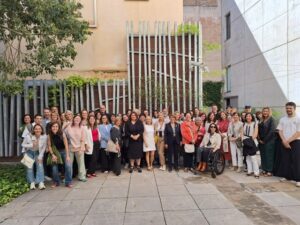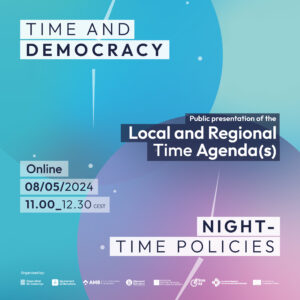At the third day of the Time Use Week, speakers and participants discussed the progress towards a new organisation of working time, since working times are key to have more equal and healthier lifestyles.
By combining the latest research on working time with experiences implementing changes in different European territories, the first session ‘Regulating working times: lessons learned, and future perspectives’ focused on the future of work from the standpoint of time and how it has been influenced by past public policies, and can be further regulated by new proposals. To begin with, Margarita León (academic director of the CUIMP Barcelona) introduced the session by highlighting the importance of connecting research with public policy efforts, “time use needs to be mainstreamed into all other policies that affect our lives”. Marta Junqué (BTUI) also stressed that “Events like this one help to spread knowledge and research on time, which helps to put into practice a better organisation of time at work”. The institutional welcome was also given by Joan Subirats, Ministry for University and Research of the Spanish Government. The minister highlighted the importance of the regulation of working time, also at the university level: “the key issue is to seek ways to reduce the amount of time spent on unreasonable working hours, and instead allow for more productivity in other areas of life, such as family life, care, lifelong professional development, among others”.
The keynote speech was given by Heejung Chung, Professor of Sociology and Social Policy at the University of Kent. She explained the flexibility paradox theory: workers with more flexible work tend to work longer and to fall into self-exploitation: “you have to seem always busy, and to be always available as that’s what the new standard is about”. In summary, she pointed out that there is a risk when the rise of flexible/remote work is likely to lead to long hours and a hyper competitive work culture resulting in bad wellbeing and more gender inequality. Therefore, the right to disconnect and other schemes for organising the week can help us reconfigure values at work and society.
The session continued with a panel discussion on past and current experiences in regulating the use of time. In relation to previous experiences, Jean-Yves Boulin (University Paris-Dauphine) explained how the Aubry law in France regulated a reduction on working hours. In the case of Spain, Ignacio Buqueras (ARHOE – National Commission for the Rationalisation of Spanish Timetables) recalled the experience from its association after 20 years fighting for healthier schedules, and stressed the importance of keep pushing the political level to achieve them. Then, Francesca Zajczyk (Delegate of the Councilor of Milano in Mobility, Sustainability and Time) explained the impact of Turco Law, approved on 2000 in Italy, that among other things made the definition and implementation of ‘Territorial and timetable Plan’ compulsory for municipalities with more than 30.000 inhabitants. Finally, Montserrat Pineda (Government of Catalonia) explained the experience of Catalonia through the timetable reform and how at present “Time policies are currently being led by the feminist policy area as it addresses many axes of inequality, including that of time, and working in partnership with other areas such as economics and labour relations”.
The second part of the session was about new experiences in the regulation of uses of time. The first intervention by Joaquín Pérez Rey (Spanish Secretary of State for Work and Social Economy) explained the intention to approve a law on time use in Spain, highlighting that “the future law on the use of time in Spain will be a legislative milestone and a way of thinking about time in a different way, adapted to people’s lives and to overcome the centrality of productive working time in our society”. Then, Ignace Glorieux (International Association of Time Use Research) explained the work market evolution in Belgium, as a reflection of a general trend on working time: “Working hours have decreased in the last years, but time pressure in families has increased and most of the part-time work is done by women, so the old division of work is there”. Finally, Will Stronge (Autonomy UK) explained how they are campaigning for the 4 Days Week as a tool to better organise working times.
The second session of the day took a deep dive on the potential proposals that a Spanish Law on time use could include, as a key opportunity, both in Spain and in Europe, to better regulate time. For that, some of the experts currently conducting a study previous to the law, explained their key ideas. Marta Junqué (BTUI) stressed that “time is a political issue and a law on the use of time must ensure the right to time for all citizens. There is now a historic opportunity for this kind of law”. She also highlighted that the proposal is based on uses of time that balance care, work, leisure, and rest, based on the principles of health and well-being, equality, productivity, and sustainability. Anna Ginés (Professor of labour law at ESADE) said that currently “working time structures our lives. In the EU working hours are long but in Spain is where the working day ends the latest”. Among the consequences are health problems —65% of workers suffer from work-related stress—, gender inequalities —75% of part-time contracts are for women—, and impacts on productivity. María Luz Vega (former official of the International Labour Organisation) talked about the need to address time uses from an international perspective and explained the ILO’s guide to balanced working time arrangements. Raquel Serrano (Professor of Labour Law and Social Security Law at the University of Barcelona) reflected on the main changes that should be made with the new law: more transparency and predictability in working time arrangements; rationalisation of working time: reduction of working hours and overtime; healthier and safer working time arrangements; more flexibility to contribute to productivity; inclusion of co-responsibility and equality in working time arrangements; and more business and social participation in working time arrangements. The session finalized with a brief reflection on where collective negotiation in Spain stands in these areas by Daniel Redondo (PhD candidate in Labour Law).
The end of the day was a roundtable with Raquel Gil (Barcelona city council), and representatives of companies from the Barcelona Network of companies for time use (Xarxa NUST), and the Bilbao Network (DENBBORA Bilbao Bizkaia). Under the title “Time organisation: an emergent factor for inequalities on the labour market”, companies discussed the different strategies they adopted during the pandemic to offer increased flexibility, and how they are now continuing or structuring some of them, and adopting them on their business as usual model.








